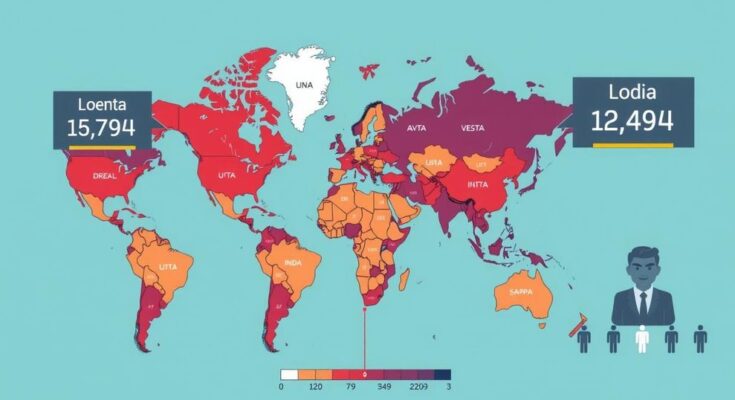The 2024 global elections reflected widespread voter dissatisfaction with incumbents across 70 countries, driven by economic instability and the lingering effects of the COVID-19 pandemic. Notable shifts included losses for established parties in India, the UK, and South Africa. The rise of right-wing populism and allegations of foreign interference were prevalent, marking this year as a turbulent period for democracy around the world, which may continue into 2025 with uncertain political prospects.
In the tumultuous year of 2024, global elections reflected a widespread voter sentiment of dissatisfaction towards incumbent governments. Across 70 nations, including influential democracies such as India, the United States, and several European countries, incumbents faced significant challenges and were often ousted. Many voters expressed their frustration with economic instability, high inflation, and lingering disruptions from the COVID-19 pandemic, resulting in a notable shift towards opposition parties and more extreme political factions. The phenomenon of electoral upheaval was echoed by experts, who noted that dissatisfaction with democracy is on the rise despite the general public’s support for democratic ideals.
Notable election results illustrated this trend, as established political parties faced losses in numerous countries. For instance, South Africa’s African National Congress suffered a setback after years of governance, leading to a coalition with opposition parties. Similarly, in India, Prime Minister Narendra Modi’s Bharatiya Janata Party lost its parliamentary majority for the first time in a decade. Furthermore, in the United Kingdom, the Conservative Party was replaced by the Labour Party following a period marked by economic distress and dissatisfaction with existing policies. These trends were accompanied by increased polarization, as voters gravitated towards smaller, more radical parties.
The rise of right-wing populism was apparent in multiple jurisdictions, notably within the European Union, where conservative and far-right parties gained traction against traditional ruling ones in nations like France and Germany. Moreover, allegations of external interference were prevalent, with numerous accusations against Russia and other nations for meddling in election processes, particularly concerning disinformation campaigns on social media platforms. This environment of uncertainty was amplified in various regions characterized by political strife, including significant protests in countries like Mozambique and Georgia.
As the year concludes, the future of democracy remains uncertain, with countries such as Germany and Canada facing approaching elections amidst disillusioned electorates. Despite these challenges, the desire for democracy persists, though many citizens express frustration over its current operational realities. Experts emphasize a crucial disparity, highlighting that while democratic ideals are appreciated, the functionality and effectiveness of political systems are increasingly under scrutiny.
The article discusses the pattern of dissatisfaction amongst voters worldwide, particularly seen in the significant political shifts during global elections of 2024. It examines the societal factors contributing to this sentiment, such as economic instability, inflation, and the aftereffects of the COVID-19 pandemic, which have catalyzed a movement away from established political parties towards opposition and extreme factions. In this context, the analysis highlights where and why incumbents have been dismissed and the implications for future electoral dynamics.
In conclusion, the electoral upheavals of 2024 reveal a profound and growing discontent with political incumbents across the globe. As economic difficulties and social unrest persist, traditional political structures are increasingly under threat. The trend towards radical solutions and growing support for alternative parties signal a pivotal moment for democracy that may shape the future political landscape. Despite the public’s support for democratic ideals, there is a clear demand for systems that deliver on their promises and reflect citizens’ expectations for governance.
Original Source: www.clickorlando.com




